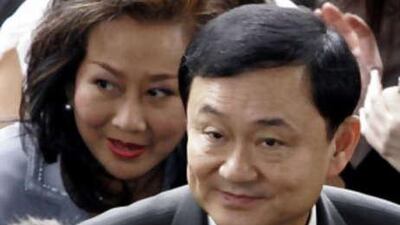BANGKOK // Thaksin Shinawatra, Thailand's former prime minister, has skipped bail and fled to London with his family rather than face corruption charges in a Thai court. He accused those who were behind the coup that overthrew him two years ago of meddling in the courts in an effort to end his career. In a handwritten press release faxed to journalists in Bangkok, Mr Thaksin said he and his wife would remain in the UK for the time being, "where democracy is more important". The former leader's escape has embarrassed the courts, but it may signal the end of his influence on the current government of Samak Sundaravej, who is widely seen as his front man. "It's the end of the road for [Mr] Thaksin - there's no way back for him," said Kavi Chongkittavorn, the chief political columnist for Bangkok's English-language newspaper, The Nation. Mr Thaksin and his wife were scheduled to appear before the Supreme Court yesterday to face charges involving the alleged purchase of government-owned land while he was in power. The couple had been to China after the court granted them permission to leave the country to attend the Olympics. Over the past few days, reports said Mr Thaksin would not return to Thailand as planned as he was preparing to live in exile. His failure to return to Thailand has fuelled speculation that he would seek political asylum in the UK. Mr Thaksin, who was ousted in Sept 2006, has significant financial interests in the United Kingdom. He bought Manchester City, an English Premier League football team, more than a year ago, and owns several properties in London. His youngest daughter studies in a university there. His other children left Bangkok for London on Sunday, a source close to the Thaksin family said. The government's anti-corruption body has frozen most of Mr Thaksin's assets in Thailand - worth around US$2 billion (Dh7.3bn). By failing to return to Thailand, he has given up hope of seeing his assets returned to him any time soon. Recently there have been reports that Mr Thaksin was having trouble paying the hefty salaries at Manchester City and that the football club was up for sale - though Mr Thaksin has since denied this. "What happened to me and my family and my close relations resulted from efforts to get rid of me from politics," Mr Thaksin reiterated in his statement. "These are my political enemies. They don't care about the rule of law, facts or internationally recognised due process." But Mr Thaksin's leaving may net the same result, according to Thai political analysts. "Thaksin's political career is effectively finished in the event that he seeks asylum or goes into exile because if he is found guilty in the court cases against, he will become a fugitive," said Thitinan Pongsudhirak, a senior political analyst at Chulalongkorn University in Bangkok. The government may now breathe a sigh of relief. Since Mr Thaksin returned from self-imposed political exile this year, his political meddling has caused major divisions within the coalition, led by the Peoples Power Party, built from the ashes of Mr Thaksin's Thai Rak Thai. Thousands of people have taken to the streets in sometimes violent protests demanding an end to Mr Thaksin's political influence and stepped up calls for the Samak government to resign. "Mr Thaksin's influence on Thai politics will wane, and this will have a profound impact on the country's political system and parties," Mr Thitinan said. "The PPP is certain to split into more factions and divisions, which is likely to lead to its demise," he said. "Thailand faces an immediate future of instability and ineffective government compared to the period of the TRT - when there was a political vision and serious economic restructuring under a coherent populist agenda." Mr Thaksin appealed to his support base - the impoverished farmers in the Thailand's north-east and the poorest in the capital - to be patient. "I must apologise again for deciding to come to live in England. If I am fortunate enough, I will return and die on Thai soil, just like other Thais," he wrote. But Mr Thaksin's latest move may yet prove too much for the former prime minister's staunchest admirers, many of whom see him as a saviour figure. They understood why he fled the military junta, but they will be bewildered by his latest move into self-exile. "I don't understand him - why he had to leave Thailand now," said Rang, a 20-year old single mother in Bangkok, who has supported Mr Thaksin ever since she can remember. "We are all suffering here. If he really supports the poor, he should be here with us." Now he is a fugitive from the courts. Although the arrest warrants have been issued, the next step will be for the Thai government to ask for extradition. This will be a drawn out affair - as the only extradition treaty is a bilateral criminal treaty signed between Britain and Thailand in 1911. The army-appointed interim government considered using it to try to extradite Mr Thaksin last year, but never lodged a formal request. ljagan@thenational.ae

Former Thai PM Thaksin flees to the UK
The former Thai prime minister Thaksin Shinawatra skips bail on corruption charges and goes into exile in the UK.
Most popular today
